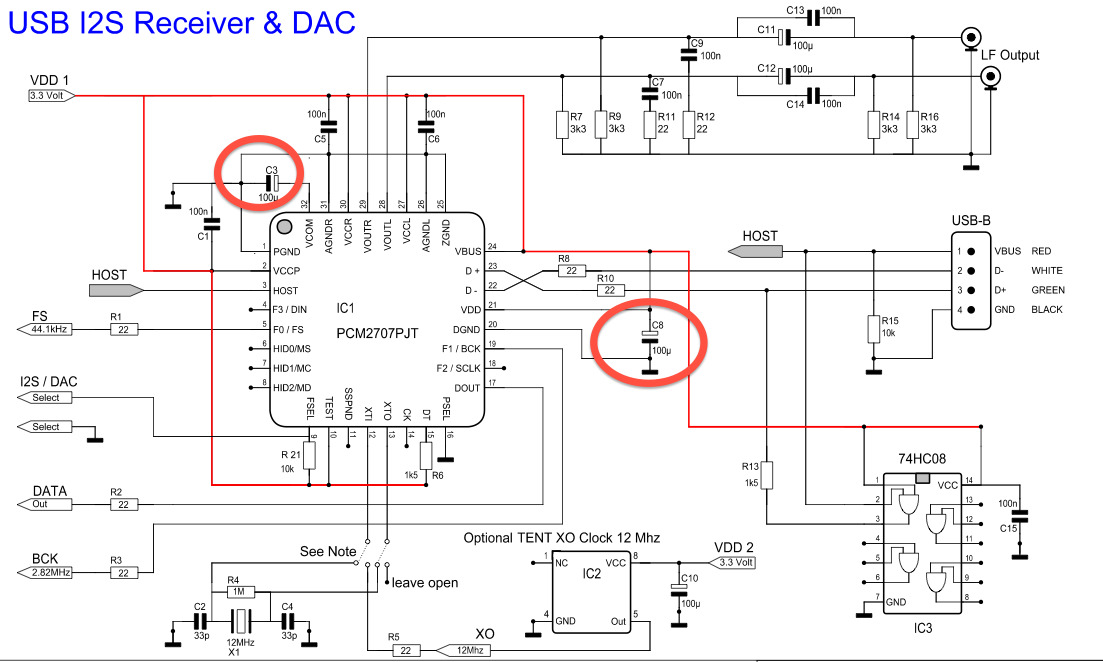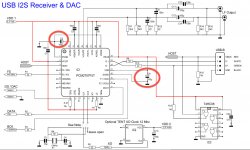Have a DDDAC 1543 mkII, assembled long ago, about 10 years. Worked fine back then.
Ten year DIY hiatus.
Fast forward to 2019, I'm having trouble with USB (PCM2707) getting recognized: USB enumeration errors.
PCB looks fine, apart from some rust on not used pads. Gave it a thorough clean, and reflowed all solder joints on non SM parts.
It gets recognized one time out of fifty. Usually after tinkering measuring live voltages on it.
I followed Texas Instruments Troubleshooting USB enumeration errors but found nothing.
Uses Guido Tent XO, measured freq with a digital multimeter, stable 12MHz.
VDD: 3,39V
USB: > 5V
Piggy-back soldered new caps on PCB underside for circled positions, just in case original caps had dried after 10 years:

No change.
Tried several USB cables, and different computers, same symptoms.
Tried battery power, and the hefty transformer linear unregulated PSU I use with it; same issues.
Any hints or pointers welcome, don't have a clue what to check for next.
Ten year DIY hiatus.
Fast forward to 2019, I'm having trouble with USB (PCM2707) getting recognized: USB enumeration errors.
PCB looks fine, apart from some rust on not used pads. Gave it a thorough clean, and reflowed all solder joints on non SM parts.
It gets recognized one time out of fifty. Usually after tinkering measuring live voltages on it.
I followed Texas Instruments Troubleshooting USB enumeration errors but found nothing.
Uses Guido Tent XO, measured freq with a digital multimeter, stable 12MHz.
VDD: 3,39V
USB: > 5V
Piggy-back soldered new caps on PCB underside for circled positions, just in case original caps had dried after 10 years:
No change.
Tried several USB cables, and different computers, same symptoms.
Tried battery power, and the hefty transformer linear unregulated PSU I use with it; same issues.
Any hints or pointers welcome, don't have a clue what to check for next.
Attachments
Last edited:
measure the voltage here:
https://ctrlv.cz/shots/2019/01/30/nDTq.png
if is 3.3V, try to reflow all pins on PCM2707, if not helped, carefully change the PCM2707 for new one (heatgun for smd, solderflux ...)
alternatively you can use any USB/I2S device board instead of that original one, cheap 10usd from ebay (PCM2706 USB To I2S) or pricy and better one based on xmos or amanero
https://ctrlv.cz/shots/2019/01/30/nDTq.png
if is 3.3V, try to reflow all pins on PCM2707, if not helped, carefully change the PCM2707 for new one (heatgun for smd, solderflux ...)
alternatively you can use any USB/I2S device board instead of that original one, cheap 10usd from ebay (PCM2706 USB To I2S) or pricy and better one based on xmos or amanero
Last edited:
Thanks miro1360! Will measure that.
So the usual suspect is the PCM2707? It came proffesionally soldered, it does even have mask on top of its legs.
Already have a Hecate XMOS208 TCXO coming... have a Tent XO on the DDDAC board, these have provided me stellar results on reclocking scenarios so wanted to try salvaging it.
Don't have a clue about relative precisions of Tent XO vs the Hecate, guess should be on par?
The Hecate LT also incorporates an ultra-low phase noise TCXO clock from Japan KDS. Its accuracy is 2PPM and jitter less than 0.5PS. Excellent performance can be expected from this interface for high fidelity playback. The Jitter of the final map was measured at 4.6ps
According to Guido
+/- 50ppm / Measured jitter <1ps rms
Assuming same conditions, that's a a 4x improvement, whether if that is noticeable or not...
So the usual suspect is the PCM2707? It came proffesionally soldered, it does even have mask on top of its legs.
Already have a Hecate XMOS208 TCXO coming... have a Tent XO on the DDDAC board, these have provided me stellar results on reclocking scenarios so wanted to try salvaging it.
Don't have a clue about relative precisions of Tent XO vs the Hecate, guess should be on par?
The Hecate LT also incorporates an ultra-low phase noise TCXO clock from Japan KDS. Its accuracy is 2PPM and jitter less than 0.5PS. Excellent performance can be expected from this interface for high fidelity playback. The Jitter of the final map was measured at 4.6ps
According to Guido
+/- 50ppm / Measured jitter <1ps rms
Assuming same conditions, that's a a 4x improvement, whether if that is noticeable or not...
Last edited:
TDA1543 is R-2R DAC and is not so sensitive to the jitter. You do not need to deal with tens of jitter.
- Status
- Not open for further replies.
